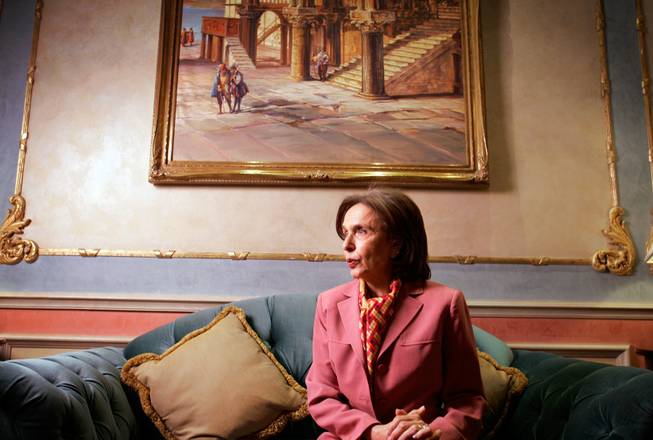
Haleh Esfandiari, Middle Eastern scholar, sits in the VIP lounge at the Venetian on Monday before speaking at UNLV’s Saltman Center for Conflict Resolution. She was in town as an ambassor for the Woodrow Wilson Center, which was giving an award to Las Vegas Sands owner Sheldon Adelson.
Tuesday, March 25, 2008 | 2 a.m.
Audio Clip
- Haleh Esfandiari, Director of the Middle East Program at the Woodrow Wilson Center, discusses the need for communication between the U.S. and Iran.
-
Audio Clip
- Esfandiari shares her opinions about the conditions needed for a change to take place in Iraq.
-
Audio Clip
- Esfandiari discusses the conditions of her 105-day imprisonment in Iran.
-
Audio Clip
- Esfandiari talks about the possibility of a U.S. attack against Iran.
-
American conservatives used an ingenious rhetorical ploy before the Iraq war, accusing war critics of being morally obtuse, of turning their backs on the suffering of the Iraqi people. It was always a slightly suspect argument, as if there were only two options — war or tolerance of murderous tyranny. But it worked, as influential liberals in the New York-Washington corridor soon became liberal hawks, giving the preemptive attack a certain left-center mainstream credibility.
Now, many of the same conservatives are pushing the same line about Iran, condemning the regime as an enemy of liberty and a threat to Israel and the United States. Those not in favor of regime change, the argument goes, are naive or insufficiently committed to democracy and human rights.
But in steps Haleh Esfandiari, the director of the Middle East Program at the Woodrow Wilson International Center for Scholars, who suffered eight months of detention at the hands of the Iranian government last year. She still favors American engagement with Tehran.
The Iranian-born scholar knows a bit more about human rights and what it’s like to lose them than her intellectual rivals on the pro-war right.
Esfandiari, who spoke at UNLV’s Saltman Center for Conflict Resolution on Monday, argues that the United States has more options than war or enabling.
“The United States should engage every country in the world, regardless, and this includes Iran,” she said during an interview Monday.
Three decades of attempting to isolate Iran with sanctions and other punitive measures have failed, she said.
As Esfandiari noted, American governments — Republican and Democratic — engaged the Soviet Union during the Cold War. The United States, led by a conservative icon, President Reagan, maintained a hard rhetorical line on human rights and fought proxy wars with the Soviets while negotiating reductions in nuclear weapon stockpiles and collaborating to avoid an accidental nuclear attack.
Esfandiari is uniquely qualified to teach Americans about Iran.
Born in Iran, she was a journalist who specialized in foreign affairs before leaving for the United States as the Islamic Revolution took hold. She’s taught at Princeton, wrote “Reconstructed Lives: Women and Iran’s Islamic Revolution” and won a MacArthur “genius grant.”
Last year, just like every year, she went to Iran to visit her mother. She was deemed a security threat and detained, and spent 105 days in solitary confinement. Solitary was difficult, but the government treated her decently, she said. She had a large cell with two windows and outside time. Later, she was given access to TV and newspapers and contact with her mother.
The Iranian government had badly miscalculated, Esfandiari said, because her cause became a worldwide rallying cry for human rights.
To this day, she doesn’t understand the detention, adding to the Kafkaesque intrigue.
She endured frequent two-hour interrogations. Sometimes, they were entertaining.
For instance, she was asked: Do you know Obama?
She was confused, scanning her mind for Persian friends or acquaintances with that name. She’d been cut off from the world and while she was gone, the man she knew as the junior senator from Illinois, Barack Obama, had become a sensation and was the first U.S. senator to take up her cause.
“Why is Barack Obama speaking on your behalf?”
Iran, where a majority of citizens are younger than 30, has shown signs of democratic and pluralistic dynamism, but can change only from within, she said.
U.S. meddling in Iranian affairs, beginning with an America-backed coup of a democratically elected government in the ’50s, has led some to conclude American interventionism is the root cause of U.S. problems in the Persian Gulf.
Still, Esfandiari said, American engagement could make the Iranian government feel more secure and less inclined to “clamp down” on civil society, as Esfandiari called government attacks on the press and civic groups.
(She’s precise in her language, declining to call it “repression” so as not to put Iran in the same universe as, say, the brutal regime in North Korea.)
Esfandiari said she doesn’t believe President Bush will attack Iran before leaving office, even with surgical strikes aimed at the country’s nuclear program. A National Intelligence Estimate released last year gave the consensus of the American intelligence community: The Iranian effort at developing uranium weapons is dormant.
A U.S. attack on Iran would result in the Iranian public, which has strong pro-American elements, rallying around the government.
Esfandiari was in Las Vegas in part as an ambassador of the Wilson Center, which was giving an award to Las Vegas Sands owner Sheldon Adelson, a significant financial backer of neoconservative organizations and hawkish Republican candidates.
That’s the beauty of a free and civil society, she said. People can sit next to one another, have dinner and disagree with gusto. And as she noted, Adelson was being feted for his charitable work. The event was apolitical.

Join the Discussion:
Check this out for a full explanation of our conversion to the LiveFyre commenting system and instructions on how to sign up for an account.
Full comments policy